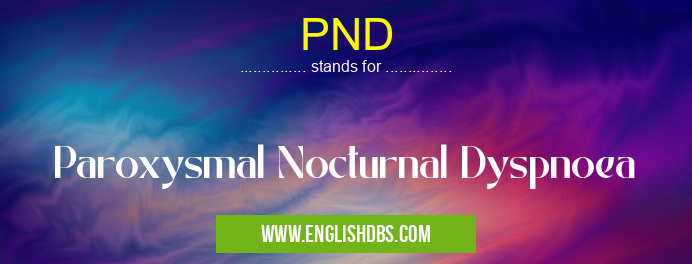What does PND mean in UNCLASSIFIED
Paroxysmal nocturnal dyspnea (PND) is a medical condition that is characterized by sudden shortness of breath, usually occurring during sleep. It is most commonly experienced in people with congestive heart failure. PND can be a sign of an underlying heart problem, although it can also be caused by other conditions such as asthma, weight gain, and pulmonary embolism.

PND meaning in Unclassified in Miscellaneous
PND mostly used in an acronym Unclassified in Category Miscellaneous that means Paroxysmal Nocturnal Dyspnoea
Shorthand: PND,
Full Form: Paroxysmal Nocturnal Dyspnoea
For more information of "Paroxysmal Nocturnal Dyspnoea", see the section below.
Essential Questions and Answers on Paroxysmal Nocturnal Dyspnoea in "MISCELLANEOUS»UNFILED"
What is Paroxysmal Nocturnal Dyspnea?
Paroxysmal Nocturnal Dyspnea (PND) is a medical condition that is characterized by sudden shortness of breath, usually occurring during sleep.
What are the symptoms of PND?
The symptoms of PND typically include coughing, chest tightness or pain, difficulty breathing, sweating or becoming unusually pale or cyanotic. These symptoms may last for several seconds to several minutes before subsiding.
Who is most likely to experience PND?
People with congestive heart failure are most likely to experience PND due to fluid buildup in the lungs and increased pressure on the heart.
Is there a treatment for PND?
Yes, treatment options for PND include diuretic medication to reduce fluid buildup in the lungs, oxygen therapy to help reduce shortness of breath and ACE inhibitors and beta blockers to improve overall cardiovascular health. In some cases, lifestyle changes such as diet modification and weight reduction may also be beneficial.
Final Words:
Paroxysmal nocturnal dyspnoea (PND) is a medical condition that can potentially indicate an underlying heart problem but can also be caused by other conditions such as asthma, obesity and pulmonary embolism. Symptoms vary from person to person but generally include coughing, chest tightness or pain and difficulty breathing which may come on suddenly during sleep. Treatment depends on the underlying cause but typically includes diuretic medications, oxygen therapy and lifestyle modifications such as diet change and weight reduction. If you think you have signs or symptoms associated with this condition please see your doctor for evaluation so they can work with you to create a personalized plan of care that meets your unique needs.
PND also stands for: |
|
| All stands for PND |
